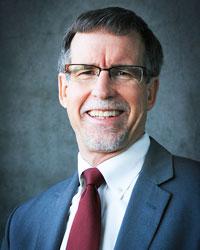Dean Dan Hirleman Highlights Engineering's Leading Initiatives
 2013 was a remarkable year for the School of Engineering. We have made great progress in research, education and outreach while adding some outstanding new faculty members.
2013 was a remarkable year for the School of Engineering. We have made great progress in research, education and outreach while adding some outstanding new faculty members.
One of our biggest research stories this year has been about the MESA Lab. Under the direction of Professor YangQuan Chen, our undergraduate and graduate students are developing the latest in drone research for civilian and public uses, and the lab was recently awarded a certificate of authorization from the Federal Aviation Administration, enabling us to take our research to the next levels in the air.
A University Communications video on the lab just earned top honors in the Council for Advancement and Support of Education (CASE), District VII’s 2014 Awards of Excellence, beating out shows produced by UC Berkeley, Cal Poly Pomona and UCSF.
There are some big developments related to our faculty and two of UC Merced’s signature research organizations, the Sierra Nevada Research Institute and the Center for Information Technology Research in the Interest of Society.
Environmental engineering Professor Martha Conklin is directing SNRI this year, and is part of a team awarded a $5 million Critical Zone Observatory grant from the National Science Foundation.
One of our newest faculty hires, Professor Joshua Viers, also in environmental engineering, directs the UC Merced site for CITRIS. Josh is a thought leader in interdisciplinary work on sensors and sensor fusion, geospatial analytics, modeling, big data, field studies and policy related to natural resources.
We are also knocking on the door of a major milestone in the School of Engineering’s development, and for UC Merced. Accreditation of three degree programs is pending with ABET, formerly the Accreditation Board for Engineering and Technology, and recognized by the Council for Higher Education Accreditation. The decision will be final and announced in July, and we are optimistic!
ABET accreditation is voluntary and achieved through a peer-review process that provides assurance that a program meets the quality standards established by the relevant profession.
It is important to UC Merced and our students for many reasons, but chiefly because an accredited degree means our students are immediately eligible upon graduation with a bachelor’s degree to compete for all the fantastic jobs out there, such as working for NASA.
We are also even more literally knocking on the door of the new Science and Engineering Building 2. The project is on schedule and on budget. It will provide more than 25,000 square feet of new lab space, outstanding shared (core) facilities for microscopy and mass spectroscopy and some amazing new teaching labs.
Finally, we also want to share a couple of exciting new initiatives of related to the school:
- First, UC Merced will become one of 12 universities in the launch of the Pathways to Innovation Program, funded by the National Science Foundation through Epicenter and the National Collegiate Inventors and Innovators Alliance. You can read more about it in this issue of Panorama and on the campus’s homepage on Monday.
- Second, the schools of Engineering and SSHA have joined forces with support from UC and Richard Blum to establish the UC Merced Blum Center for Developing Economies. Our Blum Center is unique in its focus on the Central Valley as a model of a developing economy. Our goal is to help Valley communities transform themselves from poverty to prosperity. It is also unique in integrating appropriate technology, sustainability and analytics of prosperity (i.e. quantifying the real drivers and measures of regional prosperity) into community outreach activities.
- And third, we are grateful for $100,000 of support this year from Wells Fargo for projects and innovation related to water, energy and food. Developing programs and challenges related to the nexus of those three vital topics is going to be exciting!
Innovate to Grow 2014 is scheduled for Friday, May 16 (mark your calendars), and a blue-ribbon panel of entrepreneurs, angel investors and others will help us select the student project best positioned for commercialization. The winning team receives at least $25,000 – the first Wells Fargo Accelerator Award – to move its innovation toward the marketplace.
This year is already shaping up to be outstanding!
